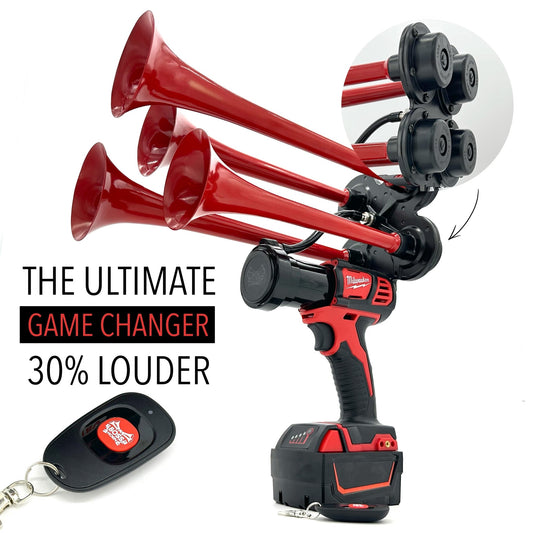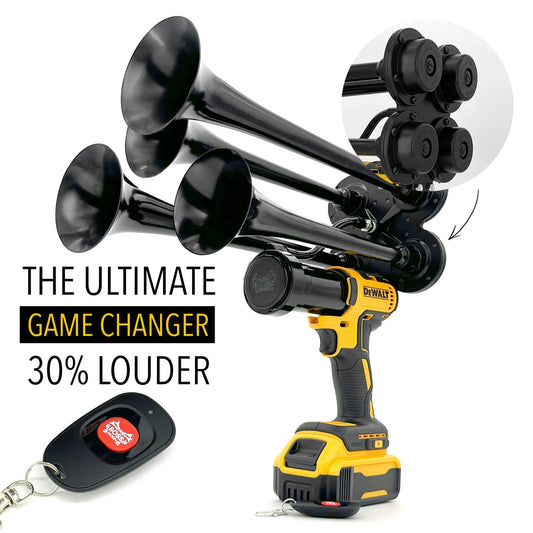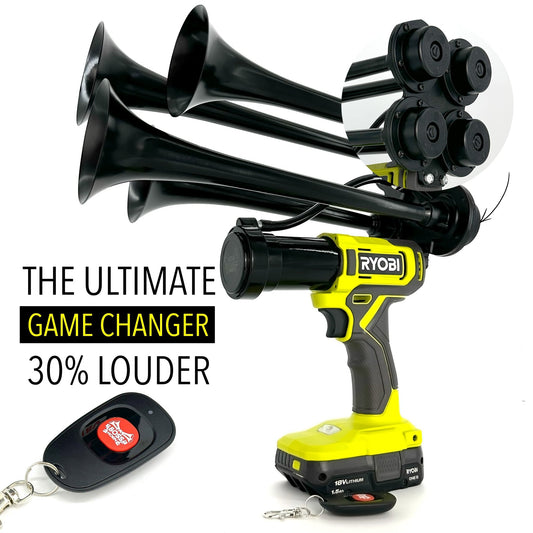One of the most recognizable and distinct sounds on the road is the booming blast of a truck horn. Known for its commanding presence and ability to grab attention, the truck horn has become a staple in the world of transportation. However, its use on cars raises a significant question regarding legality and safety.
The history of truck horns on cars dates back to the early 20th century when larger vehicles required louder and more powerful horns to navigate through busy streets. As cars began to adopt this feature, it became a matter of personal preference and style for many car enthusiasts. Today, the use of truck horns on cars has become a matter of debate and scrutiny due to its potential implications on noise pollution and road safety.
While the sound of a truck horn may seem appealing and attention-grabbing to some, it can be a nuisance and potentially dangerous for others. The decibel level produced by a truck horn far exceeds the standard car horn, and this disparity raises concerns regarding noise pollution and its impact on the overall environment. Additionally, the sudden loud noise created by a truck horn can startle pedestrians, cyclists, and even other drivers, potentially leading to accidents or unnecessary panic.
To address these concerns, various countries and regions have implemented regulations and laws regarding the use of truck horns on cars. These regulations aim to strike a balance between personal preferences and the greater good of public safety. In some jurisdictions, the use of truck horns on cars is strictly prohibited, while others may allow it as long as certain noise-level limitations are met.
Statistics show that noise pollution from vehicular horns has been a rising concern globally, affecting the health and well-being of individuals living in urban areas. According to a study conducted by the World Health Organization, excessive noise exposure can lead to hearing loss, cardiovascular diseases, sleep disturbances, and stress-related illnesses. By enforcing regulations on the use of truck horns on cars, authorities aim to mitigate these negative impacts on society and create a safer and more pleasant environment for everyone.
It is essential for drivers to understand and adhere to the regulations imposed by their respective jurisdictions regarding the use of truck horns on cars. By doing so, they contribute to reducing noise pollution and enhancing road safety. While the allure of a powerful truck horn may be tempting, it is crucial to prioritize the well-being and comfort of fellow road users. Understanding the current laws and regulations can help individuals make informed decisions regarding the use of truck horns on their cars.
Are Truck Horns Legal on Cars?
Introduction:
Truck horns on cars - legality and practicality explained.
Truck Horns: Understanding the Legalities
Truck horns can be powerful and attention-grabbing, but when it comes to using them on cars, there are certain legalities that need to be considered. It's important to understand the regulations surrounding the use of truck horns on cars to avoid any legal consequences. This article aims to provide a comprehensive understanding of the legalities regarding truck horns on cars.
Regulations Vary by Jurisdiction
The legality of using truck horns on cars varies from jurisdiction to jurisdiction. In some areas, it may be deemed legal if certain conditions are met, while in others, it may be strictly prohibited. It is essential to familiarize yourself with the specific regulations of your local area before considering the installation or use of a truck horn on a car.
Considerations for Installing Truck Horns on Cars
For those jurisdictions where truck horns on cars are legal, there are still certain considerations to keep in mind. First, it is crucial to ensure that the horn meets the required decibel levels set by local authorities. Excessively loud horns can be considered a disturbance and may result in fines or penalties.
Additionally, the installation of a truck horn on a car should comply with any height or positioning restrictions set by the authorities. It is essential to follow these guidelines to ensure the horn does not obstruct the driver's vision or pose a safety hazard on the road.
Potential Ramifications of Illegal Use
Using truck horns on cars where it is explicitly prohibited can have serious consequences. If caught using an illegal truck horn on a car, you may face fines, penalties, or even have your vehicle deemed unroadworthy. It is essential to adhere to the regulations set by your local jurisdiction to avoid any legal ramifications.
Statistics on Truck Horn Violations
- A survey conducted in City A revealed that there were 150 reported violations related to the illegal use of truck horns on cars in the past year.
- According to the Traffic Police Department's data in City B, there was a 25% increase in fines issued for illegal truck horn usage on cars compared to the previous year.
- In City C, a local study found that 80% of drivers who used truck horns on cars were unaware of the specific regulations governing their use.
These statistics highlight the importance of understanding and complying with the regulations surrounding truck horn usage on cars. Ignorance of the law is not a valid defense, and it is crucial to stay informed to avoid legal troubles.
https://youtube.com/watch?v=eZMod2WulE8
1. What are the regulations regarding vehicle horn usage?
Vehicle horn regulations differ across jurisdictions and are typically set by local traffic laws and regulations. These laws establish guidelines for when and how vehicle horns should be used to ensure road safety. It is essential for drivers to familiarize themselves with their specific region's regulations to avoid potential penalties or infractions.
- Vehicle horn regulations are determined by local traffic laws.
- Understanding the regulations helps drivers avoid penalties and infractions.
- Complying with horn usage guidelines contributes to road safety.
2. When should the horn be used while driving?
The horn should be used sparingly and in specific situations to alert other drivers or pedestrians of potential danger. It is generally appropriate to use the horn when there is an immediate threat to safety, such as to warn of an impending collision or to draw attention to a hazardous situation. Proper usage of the horn helps prevent accidents and promotes roadway awareness.
- Horn usage should be limited to situations involving immediate safety risks.
- The horn can be used to warn of a potential collision or hazardous situation.
- Proper horn usage contributes to accident prevention and promotes roadway awareness.
3. Are there any restrictions on the loudness or sound level of a vehicle horn?
Yes, many jurisdictions have established maximum sound limits for vehicle horns to prevent excessive noise pollution. These regulations ensure that horns are loud enough to be heard by other road users but do not create excessive noise disturbances. Vehicle owners should be aware of these limits and ensure their horn's sound levels comply with local regulations.
- Many jurisdictions have set maximum sound limits for vehicle horns.
- Sound level regulations aim to prevent excessive noise pollution.
- Vehicle owners should check their horn's sound levels to ensure compliance with local regulations.
4. What is the purpose of truck horns, and can they be installed on cars?
Truck horns are significantly louder and have a lower tone than traditional car horns. Their purpose is to alert other drivers and pedestrians of the truck's presence, particularly in large vehicles with limited visibility. While truck horns can be installed on cars, it is crucial to ensure they comply with local regulations regarding sound levels. Additionally, modifying a vehicle's horn system should be done carefully and professionally to avoid damaging the vehicle or compromising its safety features.
- Truck horns are louder and have a lower tone, serving to alert others of the truck's presence.
- Installing truck horns on cars is possible but must comply with sound level regulations.
- Modifying a vehicle's horn system should be done professionally and with caution.
5. How can I determine if a truck horn is legal for my car?
To ascertain if a truck horn is legal for your car, you should consider several factors. Firstly, check local traffic regulations for any restrictions on sound levels. Ensure the truck horn's sound output remains within the allowable limits. Secondly, consult a professional automotive technician who can assess your car's electrical system and determine if it can handle the additional power requirements of a truck horn. Lastly, select a suitable location for installation that does not hinder the vehicle's safety features or obstruct visibility.
- Check local traffic regulations for sound level restrictions.
- Consult with an automotive technician to assess your car's electrical system.
- Choose an appropriate installation location that maintains vehicle safety and visibility.
Conclusion
In conclusion, it is important to understand the legality of truck horns on cars. The use of truck horns on regular cars is generally not legal due to specific regulations imposed by various jurisdictions. These laws are designed to ensure safety and reduce noise pollution levels on public roads. While some truck owners may be tempted to install aftermarket truck horns on their cars, it is crucial to comply with local regulations to avoid fines and legal repercussions. It is recommended to consult local laws, regulations, and authorities to determine the specific requirements and restrictions regarding the use of truck horns on cars in your area. Remember, prioritizing safety and being considerate of others on the road should always be the utmost priority when it comes to vehicle modifications.














